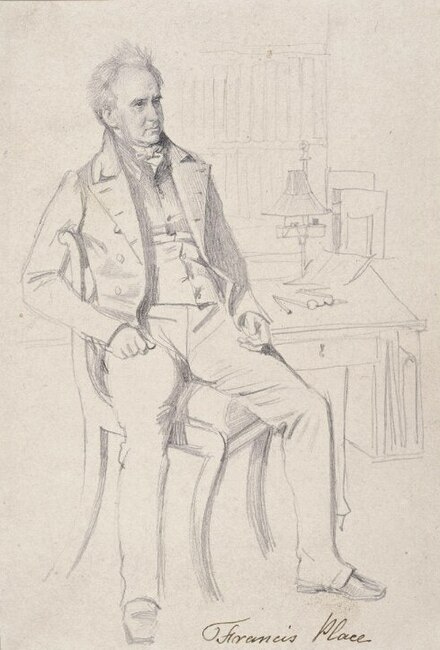Francis Place
(1771-1854) British social reformer and Neomalthusianism (population control—more on this soon) activist. Originally a maker of leather pants and a tailor, he supported his activism from the proceeds of his shop.
Place rejected religion in 1784. From his Autobiography: "It will have been seen that I was not religious. I could not believe otherwise than as I did, I could not persuade myself that there was either wisdom or honesty in attempting to stultify myself as I saw some did, but at times I doubted my reason, and endeavored to have faith, but those were transient aberrations. Hume’s writings put an end to them for ever, all doubt vanished and I was ever after at ease on this subject." (121)
In an earlier draft of his Autobiography (according to a footnote), Place had said, "Nearly all the leading members [of the London Corresponding Society] were either Deists or Atheists—I was an Atheist, That is I did not believe in God because I could not discover the existence, or conceive the possibility of such an existence as I was called upon to believe without proof. I was told a number of nonsensical things by men and I read a number of others in books, but I found that none of these persons had any more knowledge on the subject than I had myself, that is that we were all profoundly ignorant, and I could not consent either to worship their ignorance or my own. In absence of proof I could not believe. This was also the opinion of many others."
The passage continued, "No man [in the LCS] was questioned about his religious opinions, and men of many religions and no religion were members...It was well known that some of the leading members were Free Thinkers, yet no exception was ever made to any one of them on account of his speculative opinions, nor were ever brought into discussion." (198)
Place’s political thinking was influenced by William Godwin's Enquiry Concerning Political Justice (1793). According to his Autobiography, he was out of work in the summer of 1793 and read Godwin and also Hume, Locke, and Adam Smith. He read Thomas Paine's Age of Reason in 1794. Place joined the London Corresponding Society in 1794 two weeks after its founder, Thomas Hardy, was arrested for high treason and was chairman of the general committee from 1795 until 1797. During this time he commissioned an LCS “cheap edition” of Age of Reason, which resulted in a prosecution.
Between 1797 and 1798, Place read Helvetius, Rousseau, Voltaire. In the words of another biographer, Place "read avidly every available work on politics and social improvement and amassed a large library at his house at 16 Charing Cross, which became the acknowledged meeting place for reformers, both in and out of office." A lawyer and reformer named Sir Samuel Romilly said of him, "Place is a very extraordinary person. Self-educated, he has learned a great deal, has a very strong natural understanding and possesses great influence in Westminster—such influence as almost to determine the elections for Members of Parliament." (quoted in Political Protest, 37)
In 1807 Place managed the Westminster election of Sir Francis Burdett. He became acquainted with James Mill about 1808 during a period when Mill visited London regularly to dine with Bentham (according to Autobiography, note 2, p. 251), and through him met Jeremy Bentham in 1812. In 1817 Place spent two summer months with Bentham and James Mill at Ford Abbey (Autobiography, 250). Mill esteemed Place highly enough to ask him to act as a mentor to his son, John Stuart Mill. This would lead to the young Mill’s traumatic brush with the law, which I’ll cover separately.
In 1833, due to financial difficulty verging on bankruptcy, Place moved to Brompton Square. As a member of the London Working Men's Association, he and William Lovett wrote the document in 1838 that became the People's Charter. However, Place stopped supporting the Chartists when Feargus O'Connor replaced Lovett as the group’s leader and advocated violence. Place also supported the movement to repeal the Corn Laws.
As I mentioned, I’ll write more about birth control and John Stuart Mill soon. In the meantime, for more information, see:
Illustrations and Proofs of the Principle of Population, 1822
The Autobiography of Francis Place
The Life of Francis Place, 1771-1854, Graham Wallas, 1898
Francis Place, 1771-1854: The Life of a Remarkable Radical, Dudley Miles, 1988




